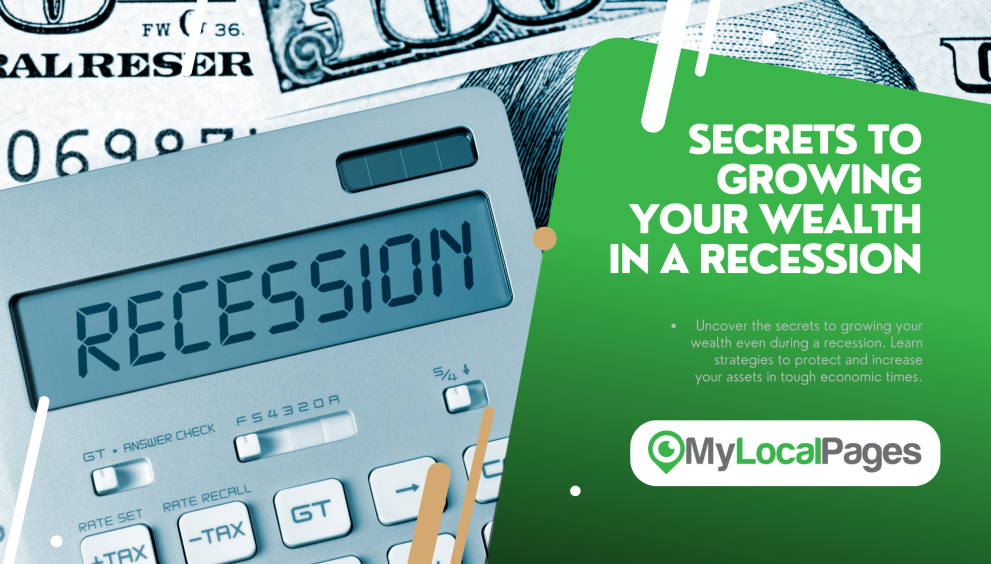Secrets to Growing Your Wealth in a Recession

Economic downturns can be daunting, but they also present unique opportunities to grow your wealth. With the right strategies, you can not only protect your assets but also increase them even during a recession. This blog will uncover some tried-and-tested secrets to growing your wealth in tough economic times.
Understanding Recession
A recession is typically defined as a significant decline in economic activity across the economy, lasting more than a few months. It’s marked by falling GDP, rising unemployment, and declining consumer spending. Understanding these factors is crucial to developing strategies that will help you thrive financially during these periods.
Why You Shouldn’t Fear a Recession
Recessions are part of the economic cycle. They are inevitable but temporary. While they bring challenges, they also present opportunities to make strategic financial moves that can set you up for long-term success.
Diversify Your Investments
Diversification is a fundamental strategy for managing risk. By spreading your investments across various asset classes, you reduce the impact of any one investment performing poorly.
Asset Allocation
Diversifying doesn’t just mean holding different stocks. It means balancing your portfolio among stocks, bonds, real estate, and possibly even alternative investments like commodities or cryptocurrencies. According to a Forbes article, a well-diversified portfolio can mitigate losses and enhance returns during a recession.
International Investments
Consider adding international investments to your portfolio. Economic downturns don’t always affect every country simultaneously or equally. International diversification can provide additional protection and opportunities for growth.
Increase Your Emergency Fund
An emergency fund is your financial safety net. During a recession, job losses and unexpected expenses become more common, making a robust emergency fund essential.
How Much to Save
Financial experts generally recommend having three to six months’ worth of living expenses saved. However, during uncertain times, increasing this to six to twelve months can provide greater security.
Where to Keep It
Keep your emergency fund in a high-yield savings account or a money market account where it can earn some interest while remaining easily accessible. NerdWallet lists some of the best high-yield savings accounts available today.
Focus on Debt Management
Managing and reducing debt is critical during a recession. High-interest debt can quickly become unmanageable when financial stability is threatened.
Prioritize High-Interest Debt
Focus on paying down high-interest debt first, such as credit cards and personal loans. This strategy saves you money in interest payments and improves your financial resilience.
Consolidate and Refinance
Consider consolidating your debts or refinancing loans to secure lower interest rates. This can reduce your monthly payments and free up cash for other financial priorities. Bankrate offers a guide on refinancing personal loans.
Invest in Yourself
During a recession, investing in yourself can pay off significantly. Enhancing your skills and knowledge can lead to better job security and new opportunities.
Education and Training
Consider pursuing further education, certifications, or training in high-demand fields. Platforms like Coursera and edX offer a wide range of courses that can boost your qualifications.
Networking
Building a strong professional network can open doors to new opportunities. Attend industry conferences, webinars, and networking events to connect with others in your field.
CTA: Enhance your career prospects with additional training and networking. Explore opportunities with My Local Pages.
Real Estate Opportunities
Real estate can be a valuable investment, even during a recession. Property values may drop, creating buying opportunities for those with the means to invest.
Rental Properties
Investing in rental properties can provide a steady income stream. Ensure you research the local rental market and consider property management services if you don’t want to handle tenant issues yourself.
REITs
Real Estate Investment Trusts (REITs) are a more liquid way to invest in real estate. They allow you to invest in real estate without the need to manage properties. Investopedia explains how REITs work and their benefits.
Discover real estate investment opportunities with My Local Pages.
Stay Informed and Adaptable
Economic conditions can change rapidly. Staying informed about market trends and economic indicators can help you make timely and informed decisions.
Regular Financial Check-Ups
Review your financial situation regularly. Adjust your strategies as needed based on current economic conditions and your personal circumstances.
Reliable Sources
Rely on credible sources for financial news and advice. Publications like The Wall Street Journal and Bloomberg provide up-to-date information and analysis.
Conclusion
Growing your wealth during a recession is challenging but entirely possible with the right strategies. Diversify your investments, build a robust emergency fund, manage your debt, invest in yourself, and consider real estate opportunities. Stay informed and adaptable to navigate these turbulent times successfully.
For more personalized advice and to develop a robust financial strategy, contact My Local Pages.
By following these strategies, you can turn the challenges of a recession into opportunities for financial growth and stability.











